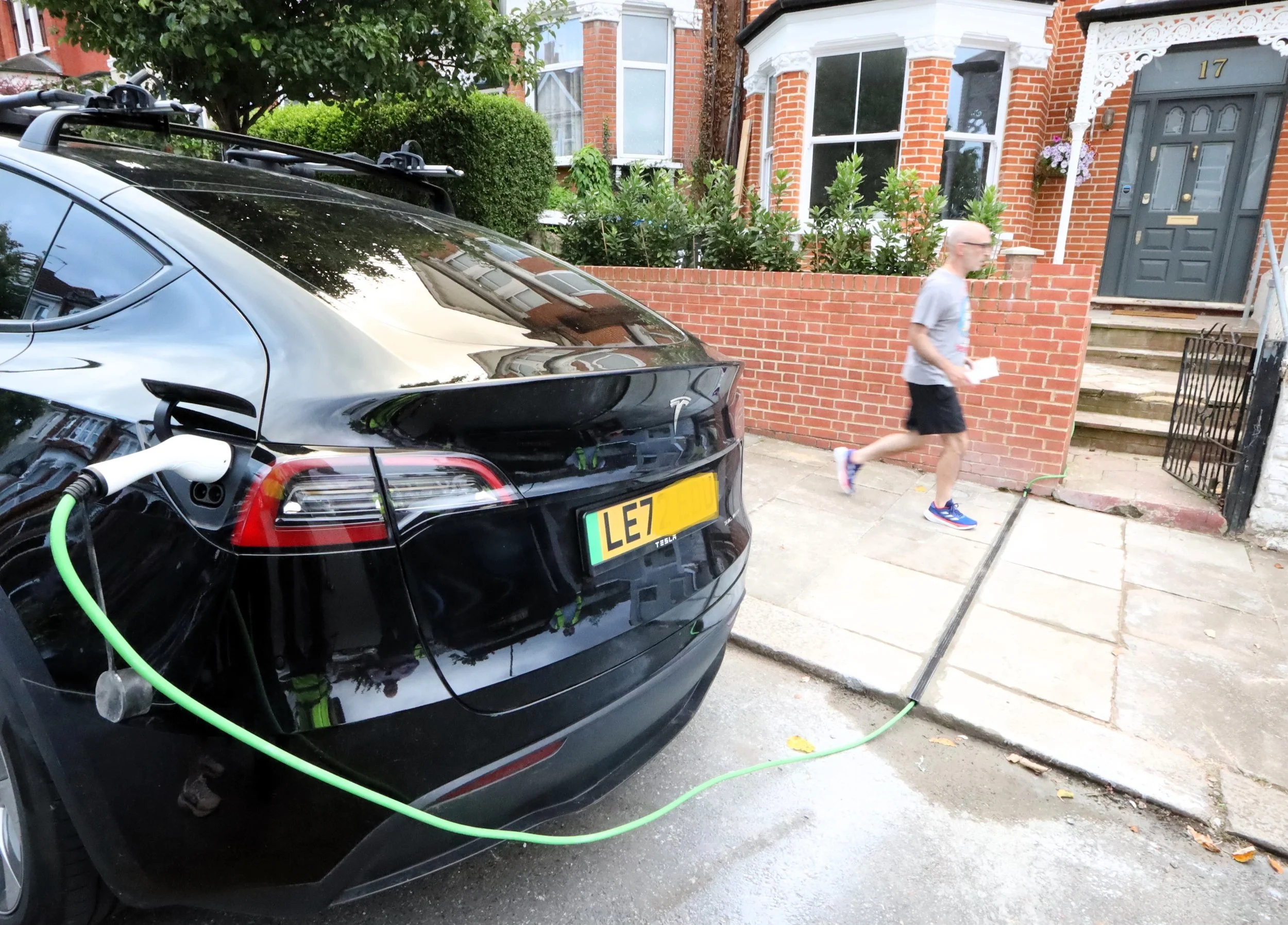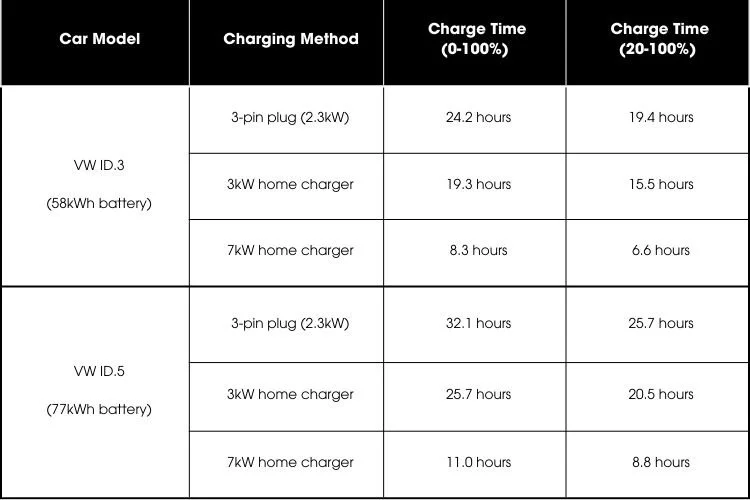How Long Does it Take to Charge an EV at Home?
If you’re currently considering purchasing an electric car, one thing you may be wondering is how long it takes to charge an electric vehicle at home.
In this guide, we’ll outline the time needed to charge an electric car depending on some key factors such as the size of the car’s battery and the speed of the connection, along with a few other variables to help you fully understand how long to estimate a full charge and how to charge your car at home efficiently.
What can affect the charging time of an EV at home?
There are three main factors that impact how fast you can charge an electric car at home.
Battery Size
Larger batteries take longer to charge. For example, the Volkswagen ID.3 has a battery capacity of 58 kWh and will fully charge in around 8 hours using a 7kW home charger. When you compare the ID.3 to its bigger sibling, the Volkswagen ID.5, the time to fully charge this model increases to around 11 hours due to the increased battery size of 77 kWh.
State Of Charge (SOC)
Reaching a full charge will also depend on how much charge your battery already has before charging. The less charge the battery has, the longer it’ll take to fully charge.
Also, did you know that an EV will charge faster between 0% - 80% compared to the final 20%? This is to help the battery keep cool, which is essential for maintaining the performance and longevity of your electric car’s battery.
Home Electrical Supply
If you live in a property built a long time ago, your electrical supply may not support the higher electrical demands of a fast charger without being upgraded. It’s always important to check this before purchasing a home EV charger.
How fast will an EV charge at home?
Below is a table showing typical charge times when using different home chargers and the difference in time when battery sizes fluctuate.
Best way to charge your EV at home
Thanks to developments in technology and the push to switch motorists to a more eco-friendly way of driving, charging your electric car at home today has never been easier, and there are several ways you can do so.
Charging an electric car with a 3-pin plug
You can charge your electric car from a standard UK 3-pin plug. This is the most basic way to charge an EV at home. It’s also the easiest way to charge an electric vehicle as all you need to do is plug your car into a standard 230V, 13A domestic socket and wait for your car’s battery to fully charge.
However, while this may be the simplest way to charge an EV’s battery, it’s also far from the most ideal scenario due to the slow charge speed, especially if you use your electric car daily.
How long does it take to charge an EV from a 3-pin plug?
Charging an EV from a 13amp socket when empty can take anywhere from 24 - 36 hours, depending on the battery size. For example, if you have a 6 kWh battery, a full charge from 0% to 100% will take around 26 hours. This is perfectly acceptable for occasional usage, but if you require your car to be fully charged every morning, this may not be the ideal solution for you.
For safety, it is essential to install a Protective Earth Neutral (PEN) fault protection device when charging an EV via a standard socket. A PEN fault can occur if the neutral conductor is disconnected or becomes faulty, which can lead to potentially dangerous conditions like electric shock or even electrocution if not managed. The PEN fault protection device monitors for faults and disconnects the power immediately if a fault is detected, protecting both your EV and your home’s electrical system.
Charging an electric car with a home charger
If charging your EV using a 3-pin plug is too slow for your needs, the best solution may be to install a dedicated EV home charger. These chargers, also known as wall boxes, can be purchased at different voltages.
Most common EV home chargers
3kW Home Chargers (Level 1)
3kW chargers are seen as entry-level home chargers and can fully charge an electric car in around 12 - 16 hours, depending on the size of your car’s battery. Despite being a slow charging solution, similar to charging via a 3-pin plug, 3kW chargers are more powerful (1.6kW faster) and also include integrated smart features.
7kW Home Chargers (Level 2)
The step up from a 3kW charger is a 7kW charger. These wall boxes increase the speed of your EV’s recharge to around 8 - 10, which makes these home chargers much more practical for overnight charging.
Is it better to have a 3kW or 7kW home charger?
If the speed to recharge your electric car is the most important factor to you when choosing a home charger, the 7kW option will be the best solution for you, as these wall boxes can recharge a typical electric car around 4 - 6 hours faster than a 3kW home charger. However, if you do not require your electric car every day as your primary source of transportation, or only travel shorter distances, a 3kW home charger could be perfectly fine for your lifestyle.
Another consideration is that the difference price-wise between a 3kW and a 7kW home charger is usually quite small. So, if you can afford the slightly more expensive 7kW, it’s well worth the investment.
Are home EV chargers worth it?
Home chargers offer much faster charging times when compared to simply connecting your electric vehicle via a 3-pin plug, saving you time and increasing practicality, especially if you require your electric vehicle daily.
In the long term, they can also save you money when compared to relying on public charge points to refill your battery’s charge. It’s estimated that you typically save around £25 each time you charge at home, compared to a public charger. You can also take advantage of off-peak rates by safely charging your EV at home overnight.
Furthermore, if you live in a terraced house and do not have off-street parking, you can take advantage of the Government’s Electric Vehicle Chargepoint Grant for Households with On-Street Parking, which offers up to 75% of the installation fee of a home charger.
By understanding the various charging methods and factors that determine how fast you can charge an electric car at home, you will be able to make an informed decision about how to set up and create your own at-home charging solution. Whichever method you choose, charging your EV at home rather than at a public charge point is a cost-effective, reliable and convenient way to charge your electric car at home.
Kerbo Charge works with a Government-backed process and charging channel solution to make charging your electric vehicle hassle-free. To see if we can help in your area, simply start the process by entering your postcode to see if our charging channel is available in your area yet.
PLEASE NOTE: This article is not intended as electrical safety advice - you should always seek advice from a qualified electrician.


